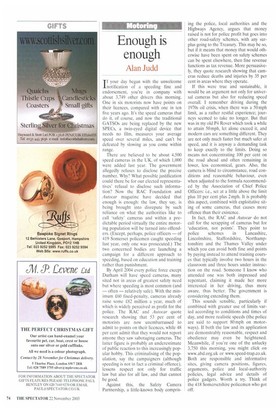Enough is enough
Alan Judd
your day began with the unwelcome notification of a speeding fine and endorsement, you're in company with about 3,749 other drivers this morning. One in six motorists now have points on their licences, compared with one in ten five years ago. It's the speed cameras that do it, of course, and now the traditional GATSOs are being replaced by the new SPECs, a twin-eyed digital device that needs no film, measures your average speed over several miles, and can't be defeated by slowing as you come within range.
There are believed to be about 4,500 speed cameras in the UK, of which 1,000 were added last year. The government allegedly refuses to disclose the precise number. Why? What possible justification could there be for our elected representatives' refusal to disclose such information? Now the RAC Foundation and Autocar magazine have decided that enough is enough: the law, they say, is being brought into disrepute by such reliance on what the authorities like to call 'safety' cameras and within a predictable period virtually the entire motoring population will be turned into offenders. (Except, perhaps, police officers — of 419 Somerset policemen caught speeding last year, only one was prosecuted.) The two concerned bodies are launching a campaign for a different approach to speeding, based on education and training rather than punishment.
By April 2004 every police force except Durham will have speed cameras, many sited not in areas of greatest safety need but where speeding is most common (and — often — relatively safe). With the minimum £60 fixed-penalty, cameras already raise some £82 million a year, much of which is widely perceived as profit for the police. The RAC and Autocar quote research showing that 53 per cent of motorists are now unembarrassed to admit to points on their licences, while 48 per cent admit that they would not report anyone they saw sabotaging cameras. The latter figure is probably an underestimate of public reaction to this increasingly popular hobby. This criminalising of the population, say the campaigners (although speeding is not in fact a criminal offence), lessens respect not only for traffic law but also for all law, and that cannot be good.
Against this, the Safety Camera Partnership, a little-known body compris
ing the police, local authorities and the Highways Agency, argues that money raised is not for police profit but goes into other road-safety schemes, with any surplus going to the Treasury. This may be so, but if it means that money that would otherwise have been spent on safety schemes can be spent elsewhere, then fine revenue functions as tax revenue. More persuasively, they quote research showing that cameras reduce deaths and injuries by 35 per cent in areas where they operate.
If this were true and sustainable, it would be an argument not only for universal cameras but also for reducing speed overall. I remember driving during the 1970s oil crisis, when there was a 50 mph limit, as a rather restful experience; journeys seemed to take no longer. But that was in my old P4 Rover which took a while to attain 50 mph, let alone exceed it, and modern cars are something different. They are not only much faster but much safer at speed, and it is anyway a demanding task to keep exactly to the limits. Doing so means not concentrating 100 per cent on the road ahead and often remaining in lower, less economical, gears. Also, the camera is blind to circumstance, road conditions and reasonable behaviour, even when adjusted to the formula recommended by the Association of Chief Police Officers: i.e., set at a little above the limit plus 10 per cent plus 2mph. It is probably this aspect, combined with exploitative siting of some cameras, that causes more offence than their existence.
In fact, the RAC and Autocar do not call for the scrapping of cameras but for 'education, not points'. They point to
police schemes in Lancashire, Lincolnshire, Staffordshire, Northamptonshire and the Thames Valley under which you can avoid both fine and points by paying instead to attend training courses that typically involve two hours in the classroom and three hours under instruction on the road. Someone I know who attended one was both impressed and repentant, claiming it made her more interested in her driving, thus more aware, thus better. The government is considering extending them.
This sounds sensible, particularly if combined with greater use of limits varied according to conditions and times of day, and more realistic speeds (the police are said to support 80 mph on motorways). If both the law and its application are demonstrably reasonable, respect and obedience may even be heightened. Meanwhile, if you're one of the unlucky 3,750 this morning, you might click on www.abd.org.uk or wwwspeed-trap.co.uk. Both are responsible and informative sites, giving camera positions, figures, arguments, police and local-authority policies, legal advice and details of police gadgets. Worth a try. Think of the 418 Somersetshire policemen who got off.


























































































 Previous page
Previous page